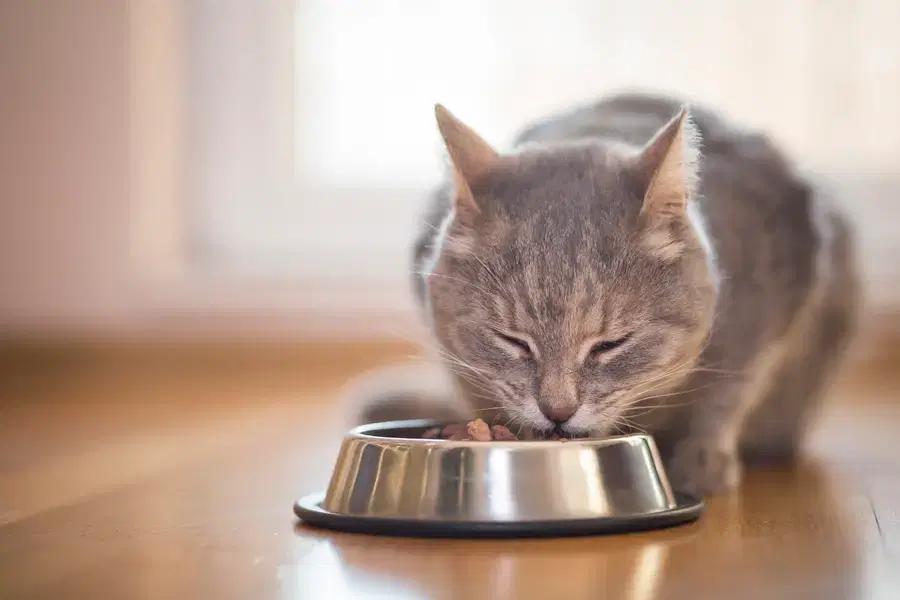When it comes to raising a kitten or cat, meeting their nutritional needs is vital to their care. And if you have a cat at home, you know how much they love peeping into your share of food, and we know how much you love sharing it with them. Most cat parents think what’s healthy for them is healthy for their cats too, which unfortunately isn’t always true.
Cashews are a very popular healthy snack option. They are delicious, bite-sized, and a great alternative for chips or something fried. But when it comes to our little furry friends, we often ask can cats eat cashews? Well, let’s find out.
Can I Give My Cat Cashews?
Yes! Cats can eat cashews! If your cat has accidentally chewed some cashews, you shouldn’t worry much; cashews are not toxic to their health. But if you want to introduce cashews to their everyday meal or as a little snack, there are a few things you should know.
5 Things to Consider When Feeding Cashews to Cats
1. Cashews Are High in Fat
Although cashews aren’t problematic for your cat, it may not be a good idea to let them munch on cashews regularly. Cashews have about 4% fat and 18% protein, which is unhealthy for your cat.
Cats are carnivores in nature and need animal-based protein to maintain their health. This is why, our cats’ digestive system isn’t good at digesting nuts or plants. They end up storing them which leads to them being overweight. Their digestive systems are better able to digest lean meats than fats, especially in high amounts, which is why it is best to feed them lean meat.
2. Risk Of Pancreatitis
Feeding cashews regularly to your cats can cause pancreatitis as it enlarges your cat’s pancreas and can cause discomfort. Here are some symptoms to look out for if your cat has been overindulgent with cashews.
The most common symptoms of pancreatitis are:
Regular fever
Vomiting
Appetite loss
Indigestion
Stomach aches
3. Cashews are Very High in Sodium
Naturally, cats aren’t supposed to eat anything high in sodium as their bodies are not good at processing it. Nuts even without salt to season are high in sodium levels.
Eating cashews or nuts high in sodium can dehydrate them. This is why, even if you are feeding your cat some cashews, make sure they have water right beside them to quench their thirst. If they have consumed excess cashews, please visit a vet.
4. Your Cat Can be Allergic to Cashews
While it is not common, cashew nuts may cause your cat to have an allergic reaction.
Some signs of your kitty being allergic to cashews can include rashes, swelling, loss of appetite, or heavy breathing.
5. Cashews Are a Choking Hazard
Just like babies, cats are at a high risk when it comes to eating nuts. They do not have the teeth to properly bite on cashews which is why they end up swallowing them instead. As a cat's airway is smaller, it can easily cause a choking hazard. Please see a vet if your cat is ever in a situation like this.
Tips On Feeding Cashews to Cats
Moderation is the key:
Whether or not it's your first time feeding your cat some cashews, it is always best to feed them anything in moderation. Feeding your cat the right amount of cashews will help prevent any kind of discomfort to your cat’s health.
Only Feed Them Good-Quality Cashews
Every cat vet or nutritionist recommends you not add any seasoning to your cat's food. And that is also true for cashews. Always look for high-quality, unseasoned, and raw cashews if it's for your cats. Seasoned food can have adverse effects on your cat’s health.
Opt For Bite-Size Cashews
If you are picking out cashews for your cat, make sure they are easy for them to bite. You can also crush the cashews to make it easier for your cats. Also, one thing to keep in mind is to separate the nut silk to avoid it sticking to their neck. And if you want to eliminate the extra steps, you can just powder the cashews in a grinder.
Is It Okay to Serve Cashew Milk to Cats?
A very common question asked by cat parents who are lactose intolerant is if their cat can have cashew milk as a substitute for cow milk. Almond, cashew, and soy milk are good options for those who cannot consume cow milk.
These milks are made by soaking your desired nuts in water and grinding them to a paste. You can then add water to the paste to make it milky.
Unfortunately, these ingredients are not suitable for your cat which is why it is best to avoid letting your cat drink cashew milk and stick to cow's milk only. Cashew milk can be a reason for your cat’s obesity and create discomfort in the long run.
Are Cashews Dangerous for Your Cat?
While there are plenty of reasons why cashews are unhealthy for your cat, they are not poisonous for your cat. This is why if they do sneak in some cashews from our share, you shouldn’t worry. However, please make sure you only treat them to unseasoned cashews as salted cashews may lead to heart dysfunction.
Conclusion:
Cashew nuts are incredibly delicious but it's best to keep our cats away from them. Cashews contain a lot of fats making them unhealthy for their diet.
In conclusion, it is best to stick to lean meats and animal-based proteins instead of nuts. There are ample snack options available in the stores that your cat will love to munch on. But if you do want them to enjoy a few bites of cashews, always remember, moderation is the key and never feed them seasoned or salted food.

The resident animal enthusiast at Spot. I have a lifetime of pet parent experience. If it has fur, feathers, or scales, I’ve probably shared my home with it. I aim to be a reliable source, blending experience with a dedication to the well-being of pets.
*Jan 2019 to Aug 2024 Spot Pet Insurance Services, LLC claims data.
Adams, Christian. "Can Cats Eat Cashews?" Catster, 11, Sep. 2025, https://www.catster.com/nutrition/can-cats-eat-cashews/.
Hunter, Tammy. "Pancreatitis in Cats," VCA Animal Hospitals, n.d., https://vcahospitals.com/know-your-pet/pancreatitis-in-cats.
"Nut Allergy in Cats," Wag, n.d., https://wagwalking.com/cat/condition/nut-allergy.
The information presented in this article is for educational and informational purposes only and does not constitute or substitute for the advice of your veterinarian.












